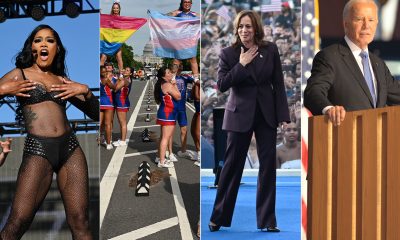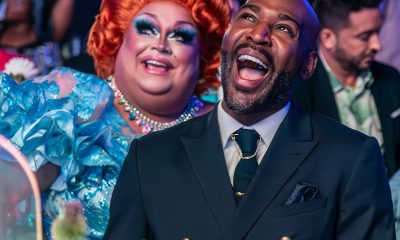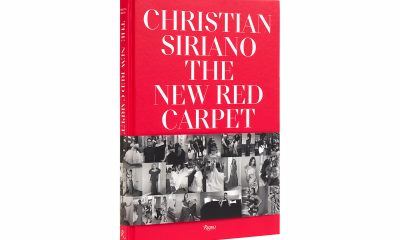Arts & Entertainment
Queer identity paramount to Frenchie Davis’ identity
‘Idol,’ ‘Voice’ and Broadway alum to perform at Blade Gala
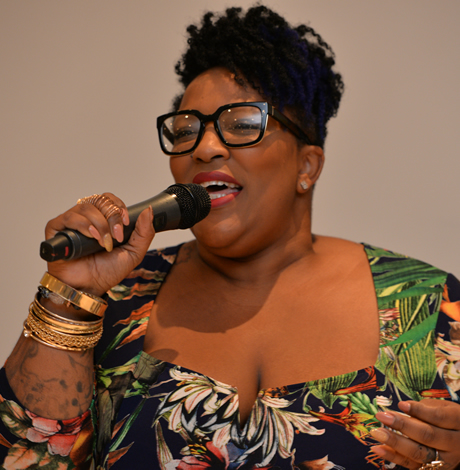
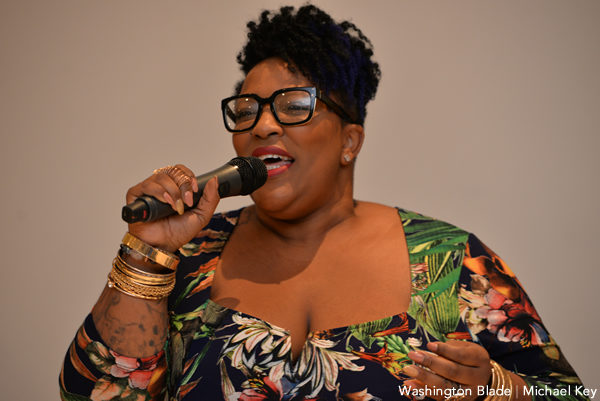
Frenchie Davis is not only a bisexual singer, actress and activist, she’s also an avid fan of the 1980s television series, “The Golden Girls.”
“You know, Bea Arthur didn’t get her first television job until she was almost 50 years old,” Davis says during a Blade interview. “You have to blaze your own trail. So, don’t try to follow my footsteps because I don’t even know where the hell they lead yet because I’m still walking them.”
Davis’ professional journey began when she left California to study theater at Howard University by day and sing in D.C.’s drag clubs at night. She performs Friday night at the Blade’s 50th Anniversary Gala.
“I sang at the Edge, at Tracks, at all the old clubs,” Davis, 40, says. “Because we tip our performers. Those tips bought groceries and paid for books.”
She credits those early experiences with helping her grow not only as a performer but as a person, and says “they were my aunts, uncles and surrogate parents.”
While still a student, Davis traveled to Germany as a “Little Shop of Horrors” cast member before returning to audition for “American Idol.” The community came through again and helped pay her way to New York.
“Every dollar raised for me to go was from someone who believed in me, so I was like, ‘Damn, now I have to see this shit through.’”
Davis delivered performances notable for both her talent and controversy. She points out she grew from that experience, which led to several Broadway and other stage performances.
“I knew Frenchie from ‘Rent,’” says bisexual writer, producer and actor J.C. Gonzalez. “As I was the first understudy to the original ‘Angel.’ She joined the cast after I had left, but everyone knows everyone on Broadway.”
Davis also marveled at all of the notable actors she came to know and work with over the years, including Billy Porter, who this year became the first openly gay black man to win an Emmy award for outstanding leading actor for his work in “Pose.” Davis and Porter worked together on “Dreamgirls” in 2004.
“Just being able to share the stage with talented people who are members of this community and opening doors for other people,” Davis says. “That’s really powerful and I feel really proud to be a part of that.”
In 2017 she received the Jose Esteban Munoz award from the Center for LGBTQ Studies (CLAGS) at the Graduate Center, CUNY for her portrayal as the butch bartender “Henri” in “The View UpStairs.”
The UpStairs Lounge was a New Orleans’ gay bar that was the target of an arson attack in 1973. It was the deadliest gay club massacre in the U.S. prior to the 2016 Pulse shooting.
“The reason we don’t know much about it is because it was the early ’70s,” Davis says. “And the few who survived the fire were so afraid of being outed that nobody ever talked about it.”
Davis and other cast members pored over police photos while preparing for the production. She recalls being moved by the burned body of a young man who failed to escape out a window.
“There was a straight club across the street,” she says. “And nobody there tried to help. Someone even said, ‘At least it burned their dresses off.’ That broke me.”
The experience and the award reaffirmed Davis’ connection to the community. But that connection hasn’t been an easy one.
“We have to acknowledge that there are racists in our community. I’ve heard white gay people use the (n-word),” Davis says, feeling an inconsistency between how people of color are treated for homophobia compared to how LGBT people are treated for racism.
“And don’t get me started on bi-phobia,” she says. “We all know of a (lesbian) who got pregnant for having sex with a guy. We all know one. So, it’s not as cut and dry as our community often places pressure on people to make it.”
Davis says life is complex and she’s even open to a polyamorous situation because of her demanding work schedule, which was a source of frustration in her previous relationship.
“It was hard because I traveled a lot. … If I’m singing on a cruise ship, I’m in the middle of the ocean, I might not be able to call you.”
For now, Davis is looking to upcoming holiday concerts in San Diego and Palm Springs as well as dropping a couple of indie mixtapes of covers called “Blunts and Alkaline Water” and “Coffee and Cocktails.” The first merges her love of acoustic cabaret and her love of hip hop. The second is a collection of her favorite jazz standards and Broadway hits.
“People love me for staying in this business for so long while maintaining my authentic self,” she says. “Others may make a lot of money but may not know who they are looking at in the mirror. I feel immense gratitude for being able to be real-life happy and enjoying the journey.”
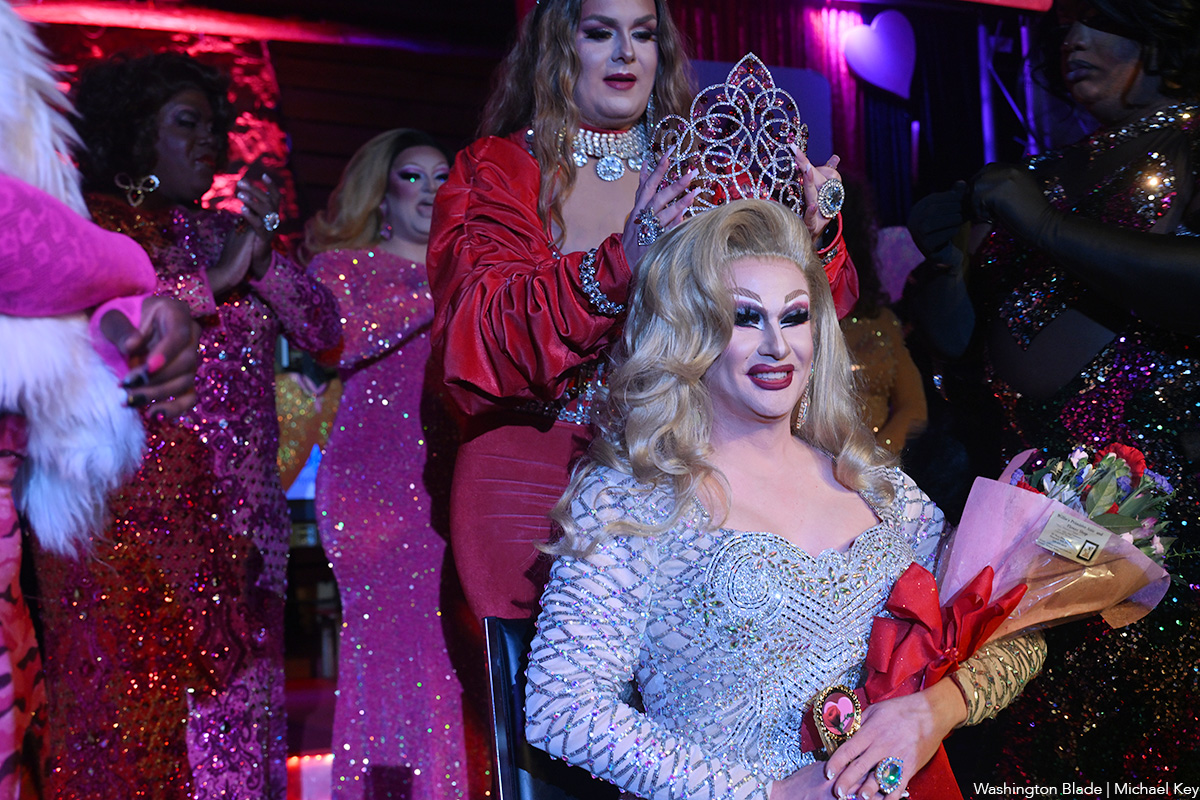
The 44th annual Queen of Hearts pageant was held at The Lodge in Boonsboro, Md. on Friday, Feb. 20. Six contestants vied for the title and Bev was crowned the winner.
(Washington Blade photos by Michael Key)
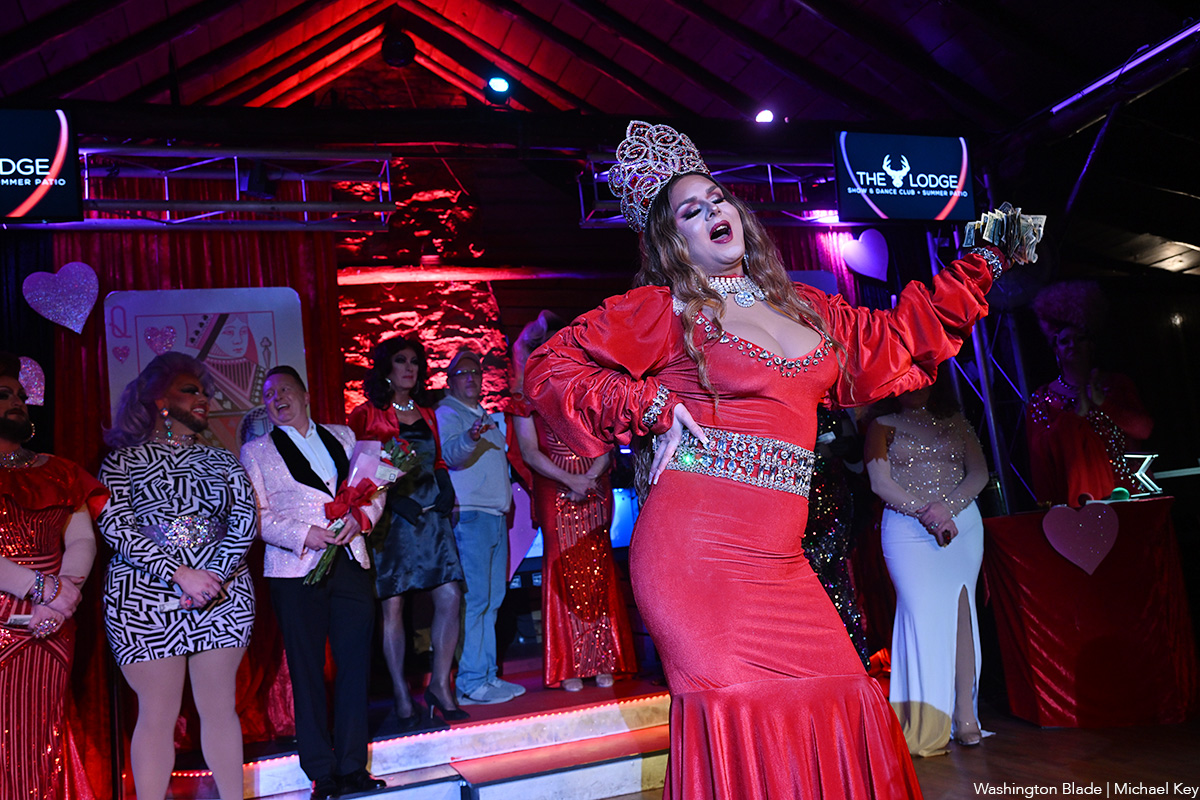
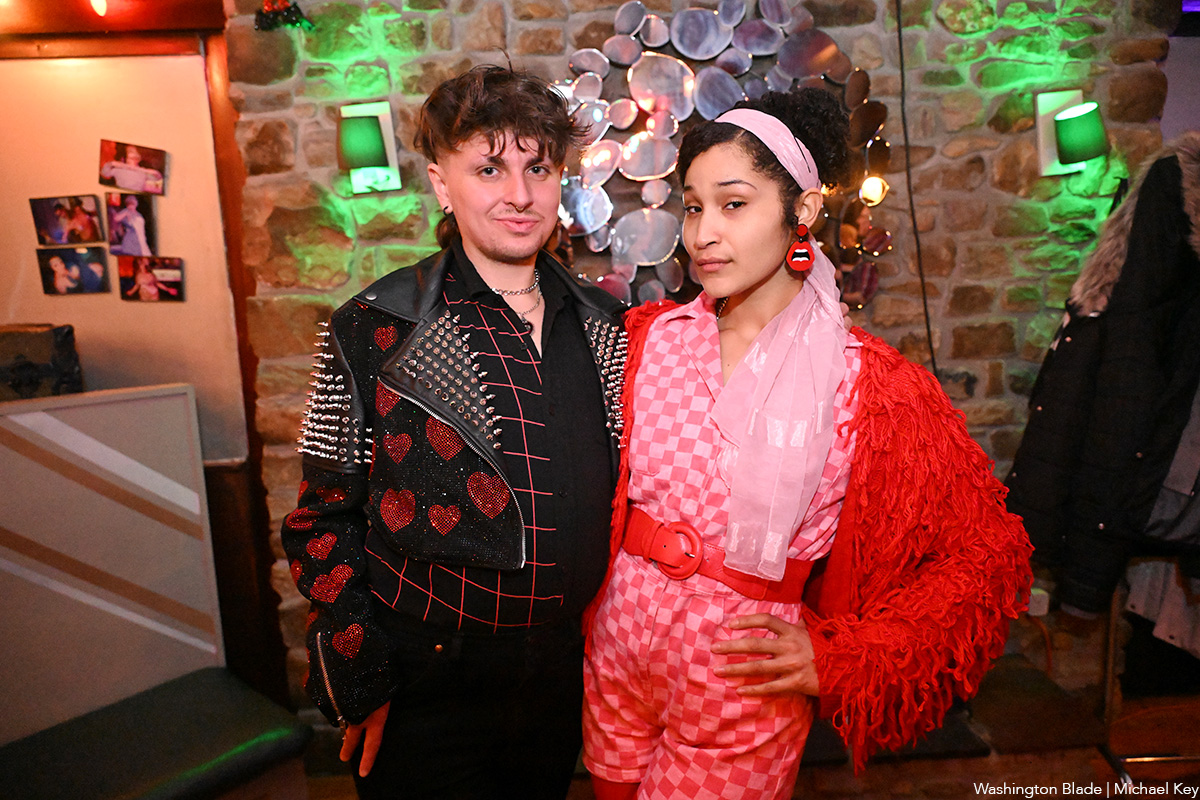
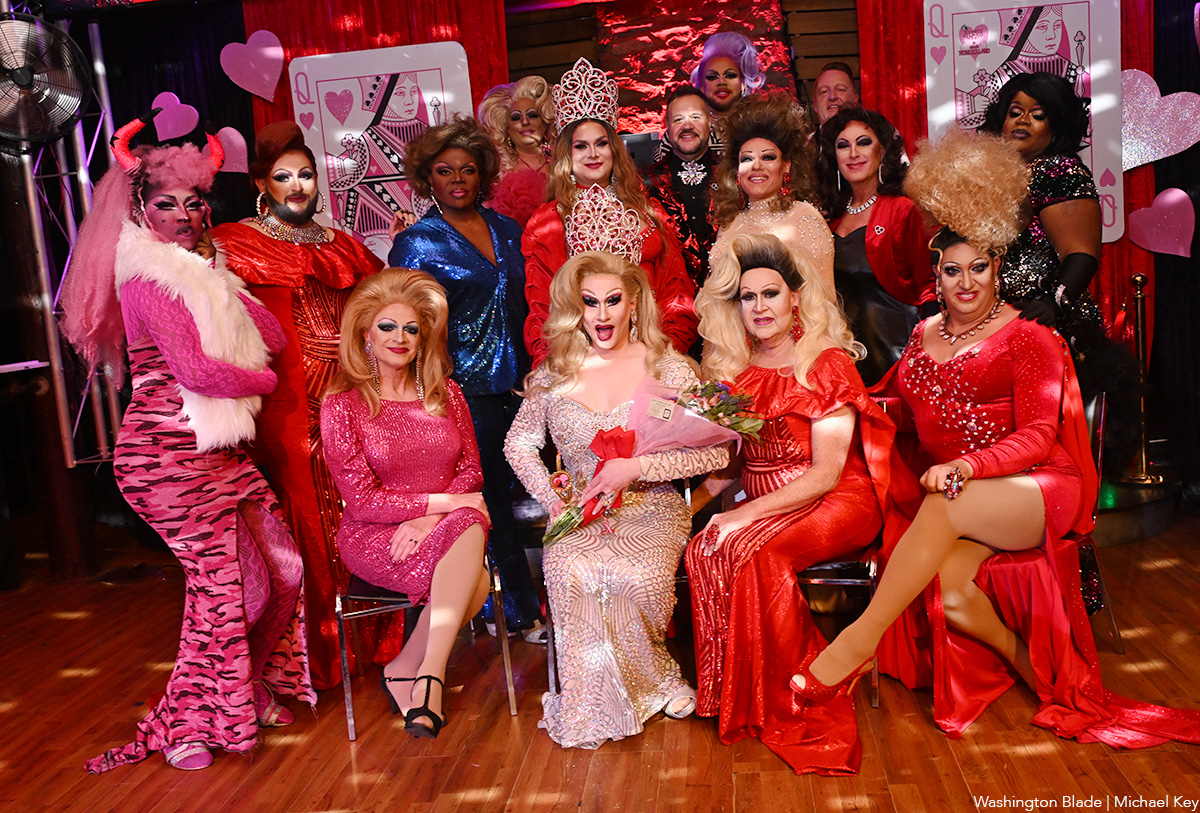
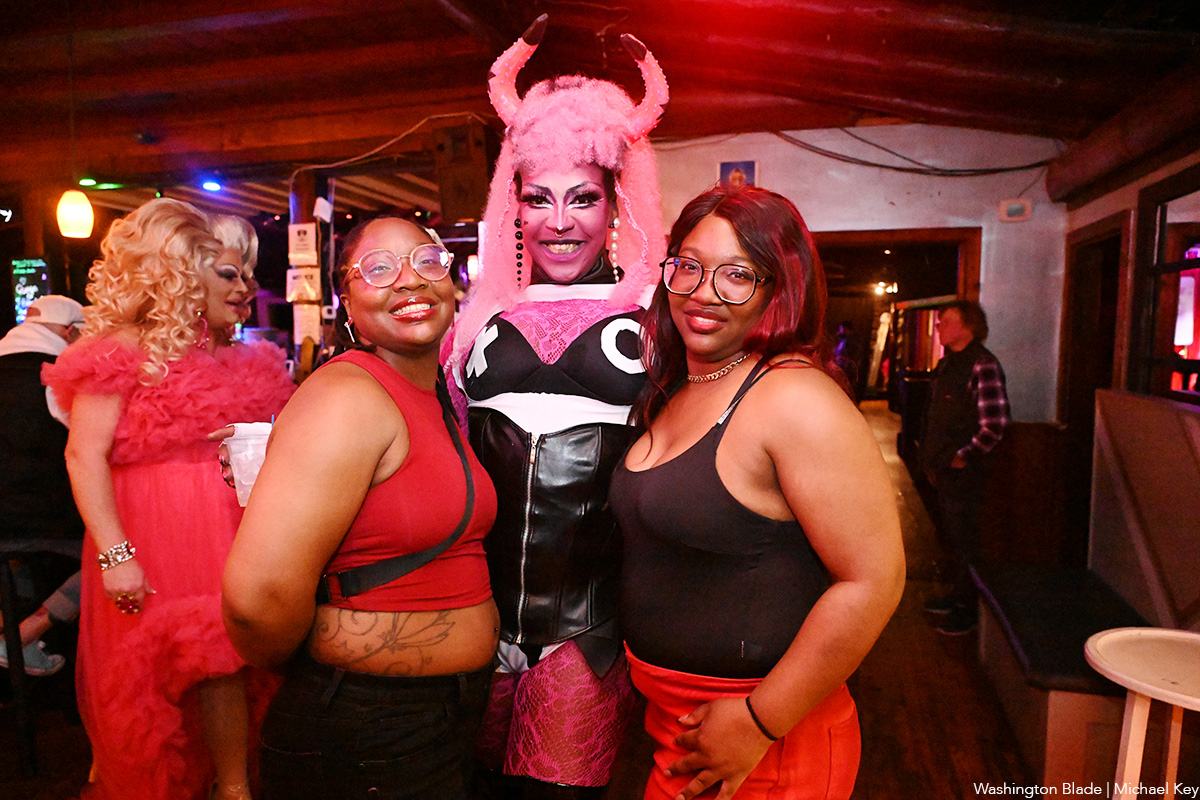
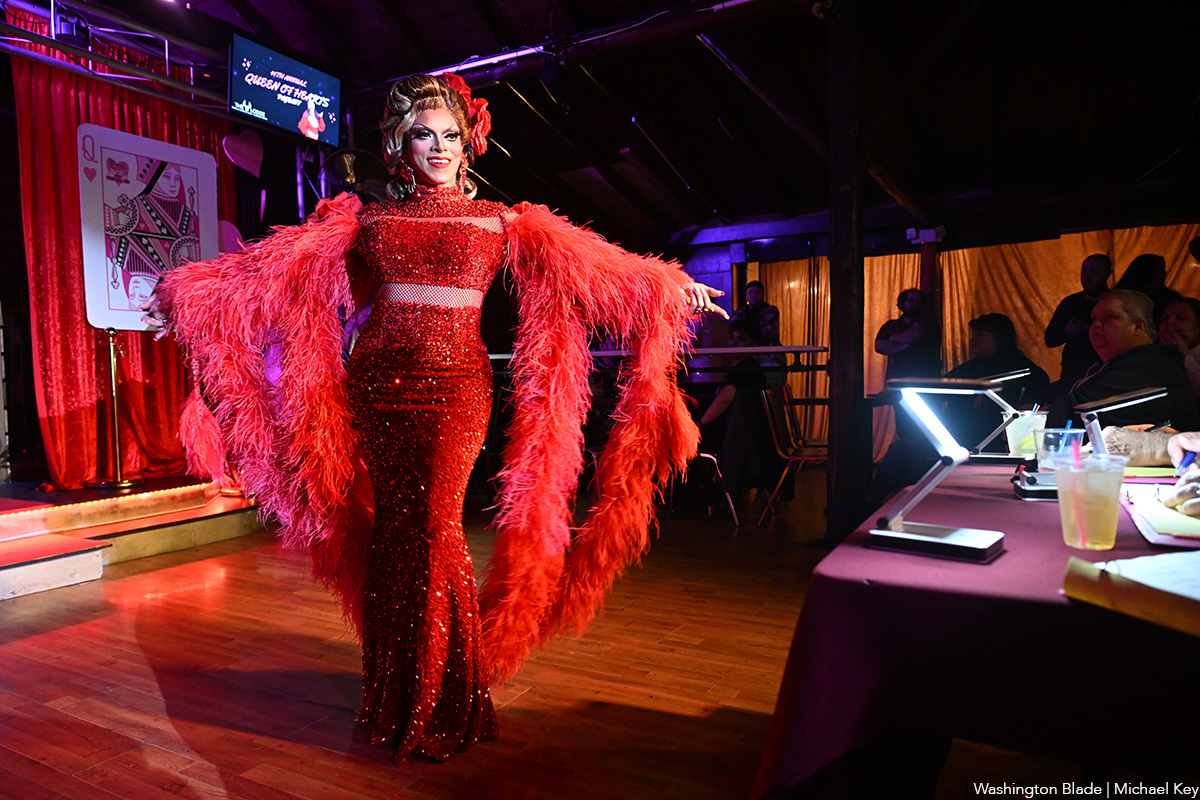
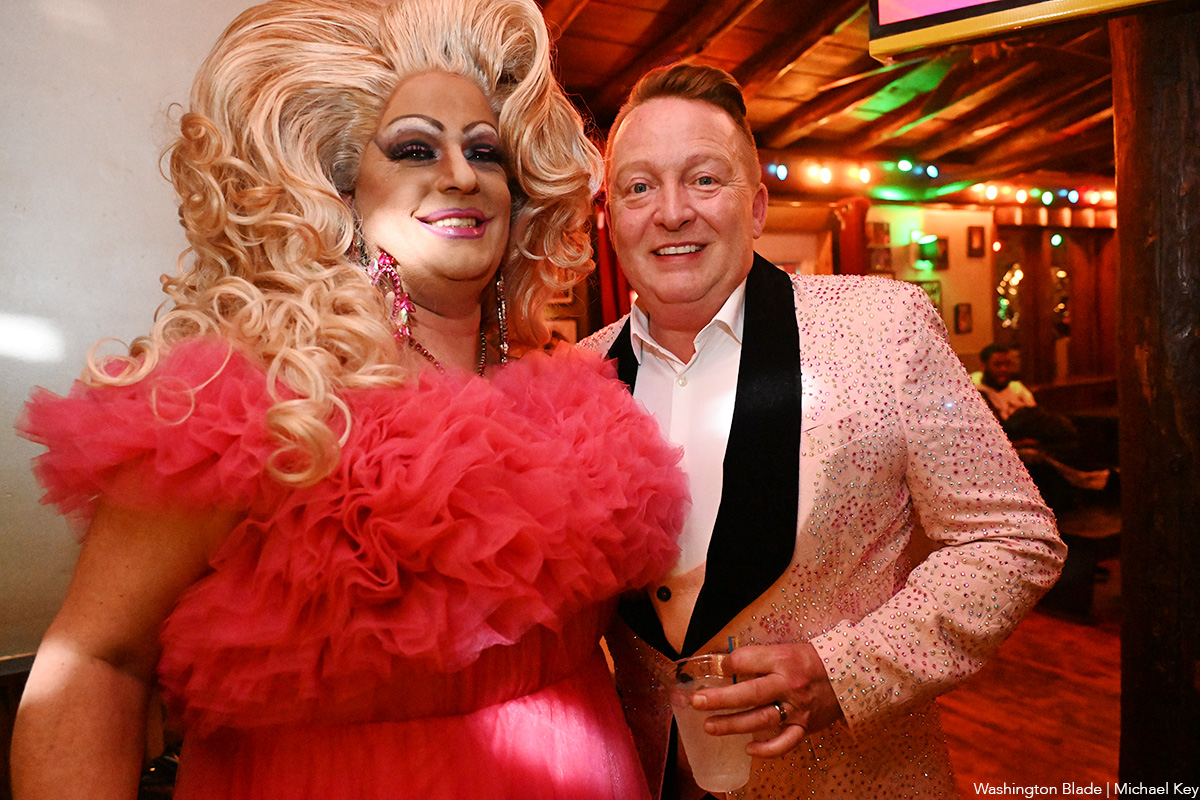
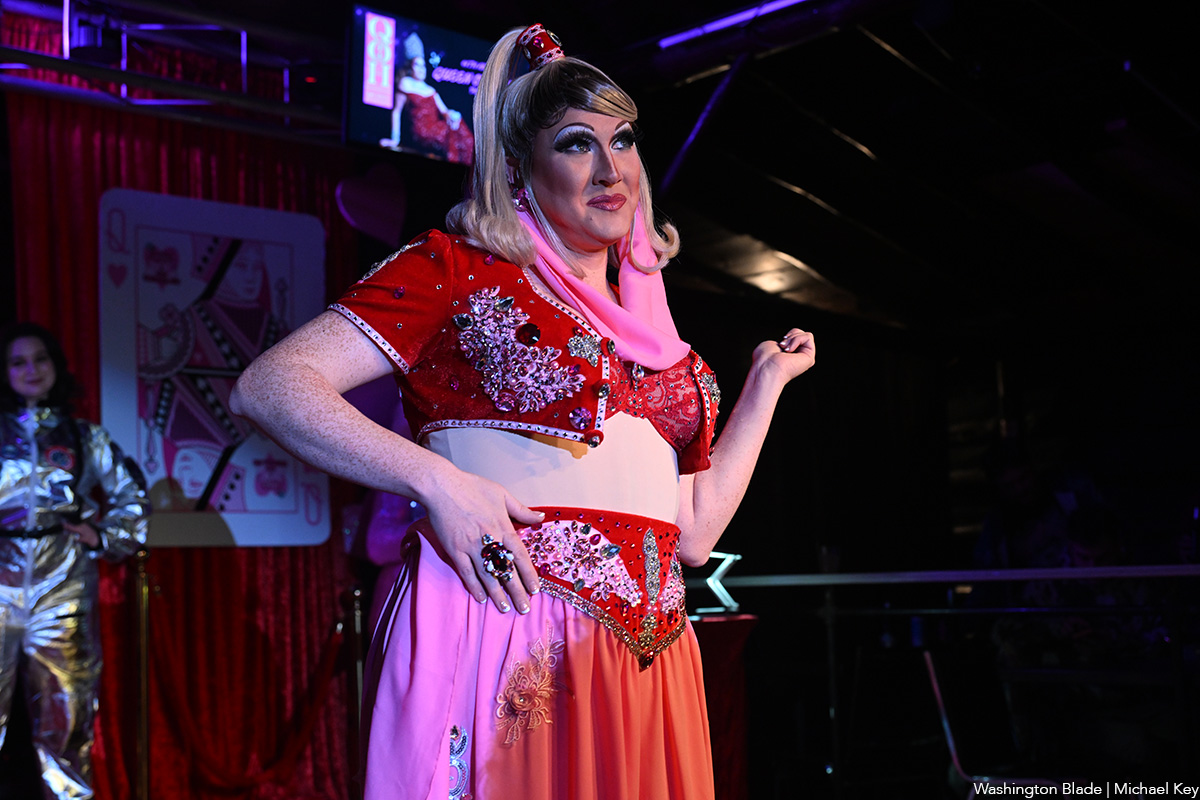
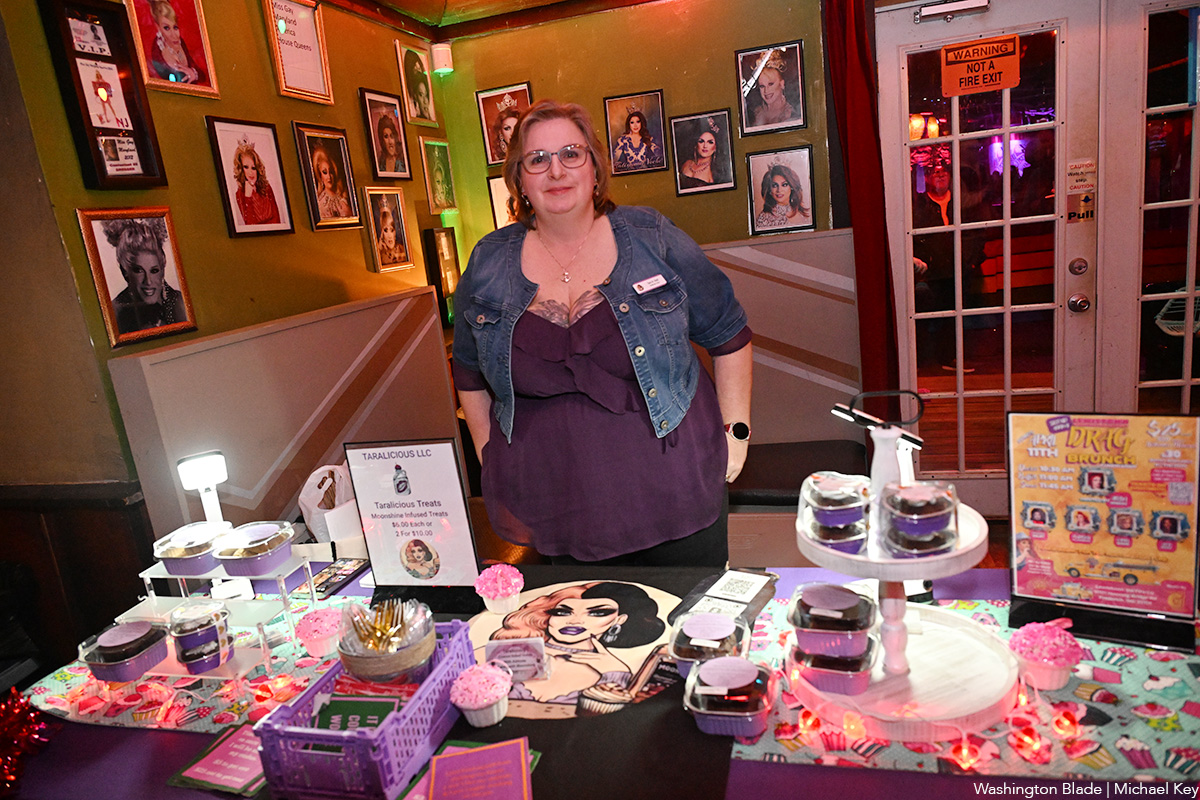
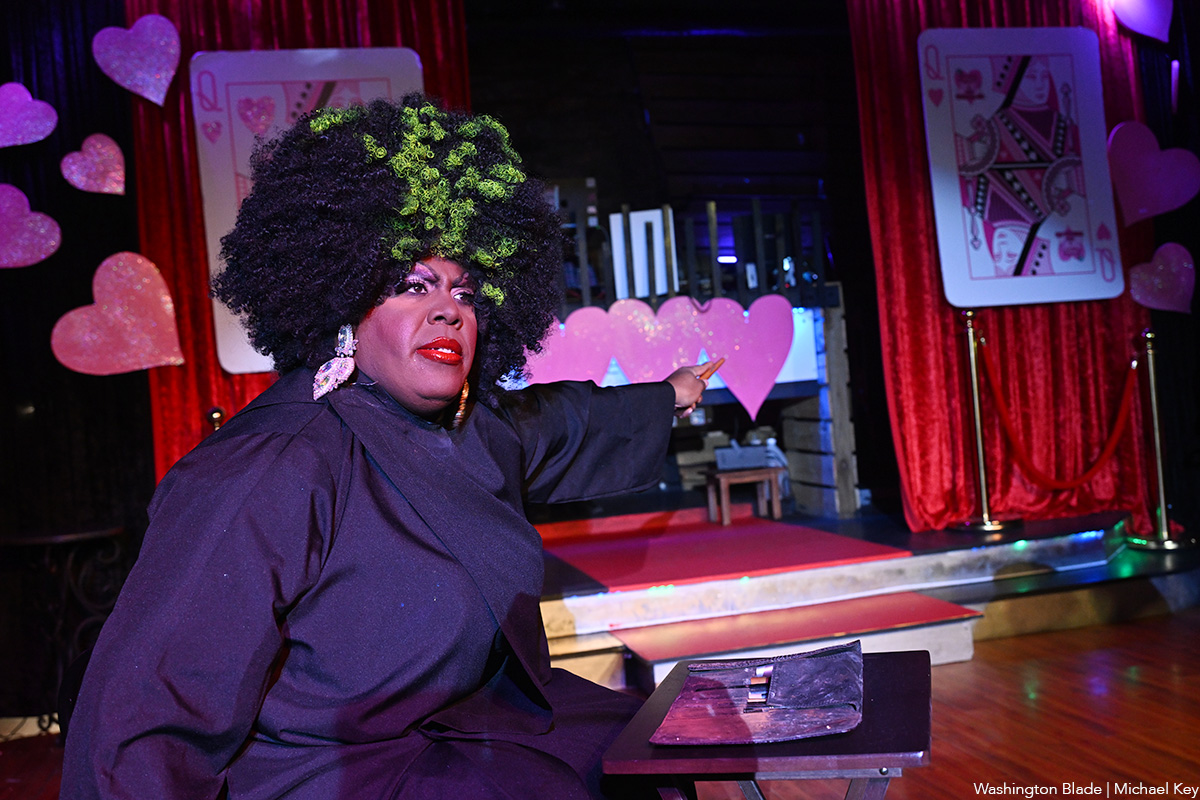
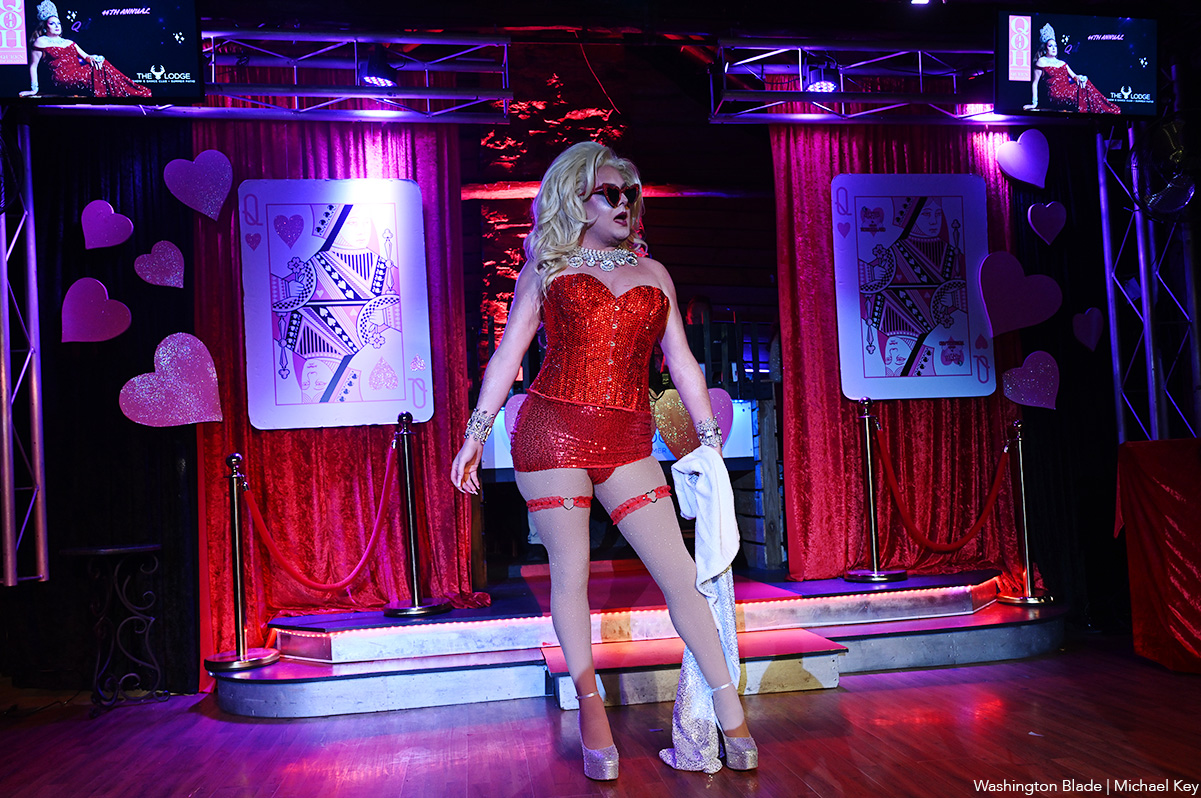
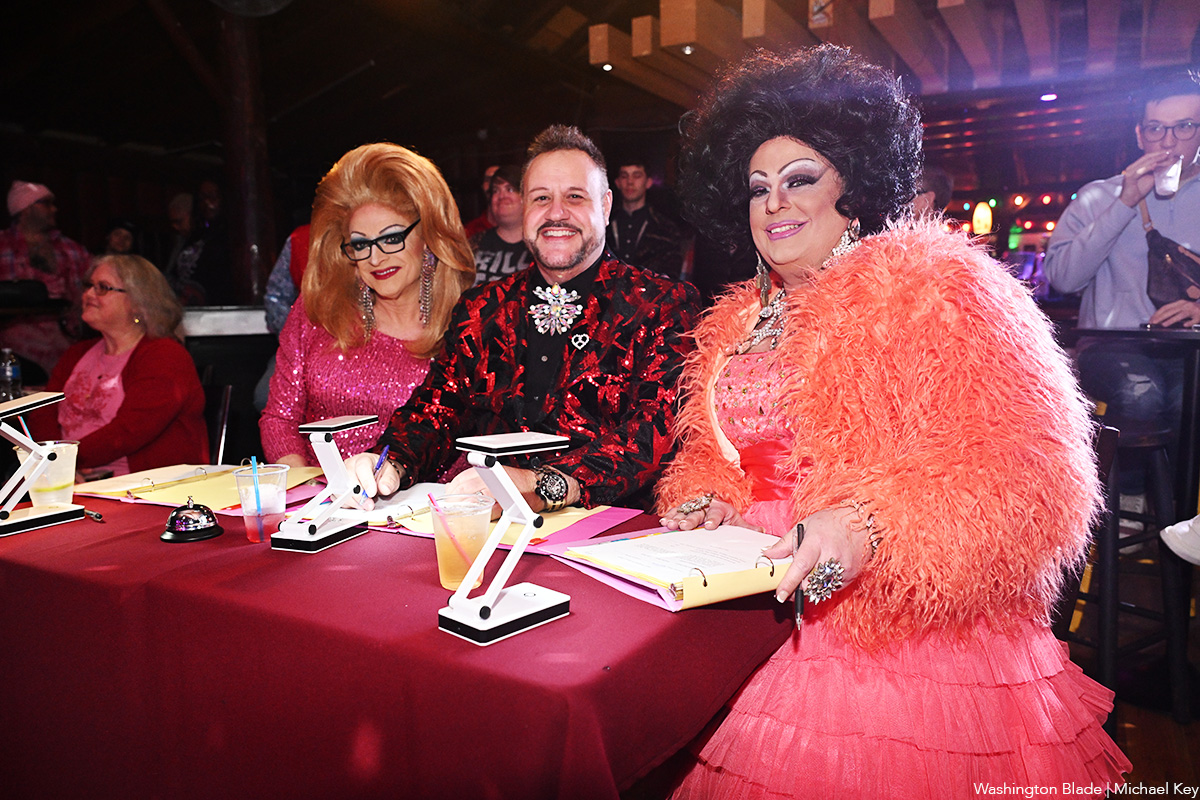
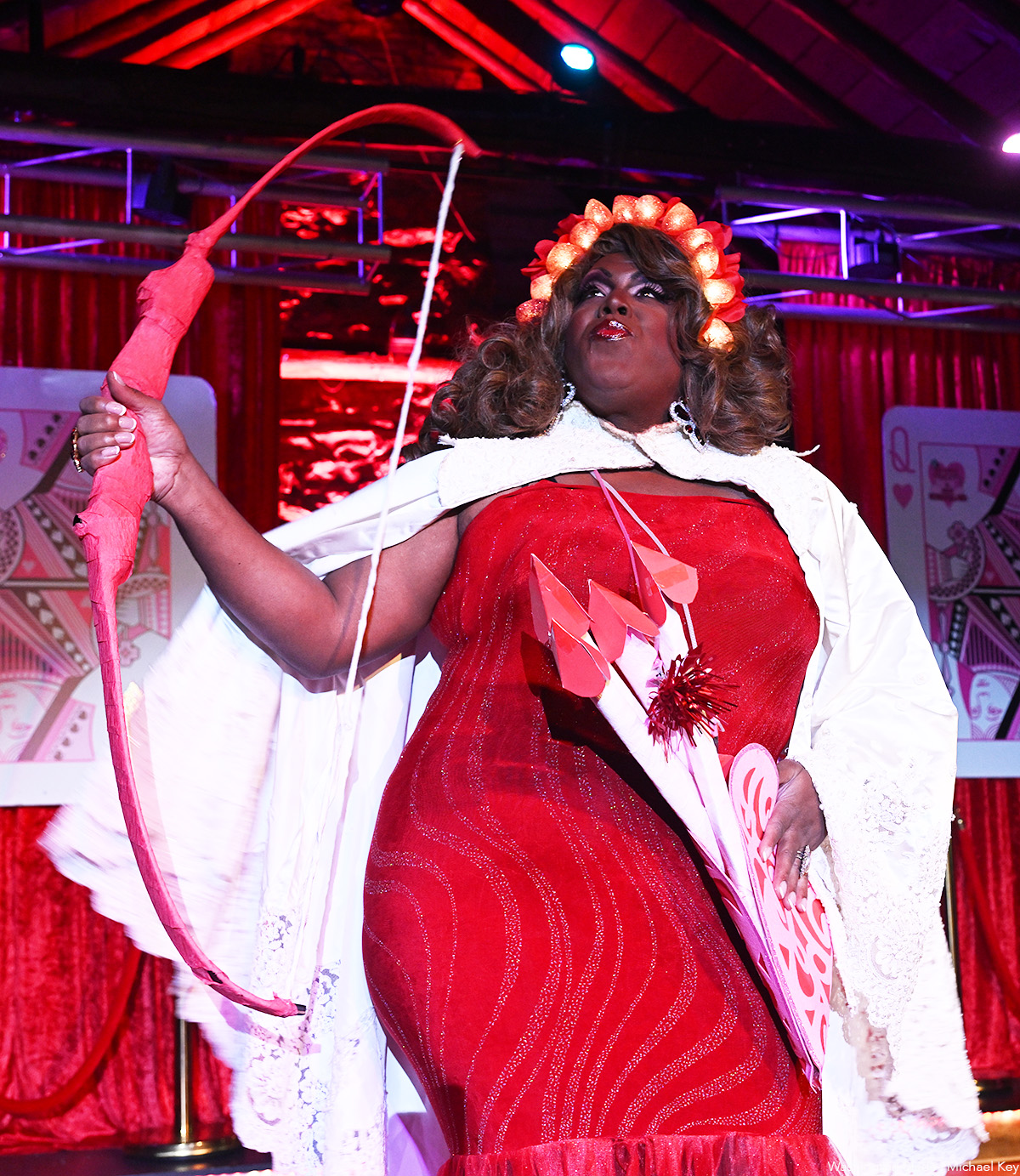
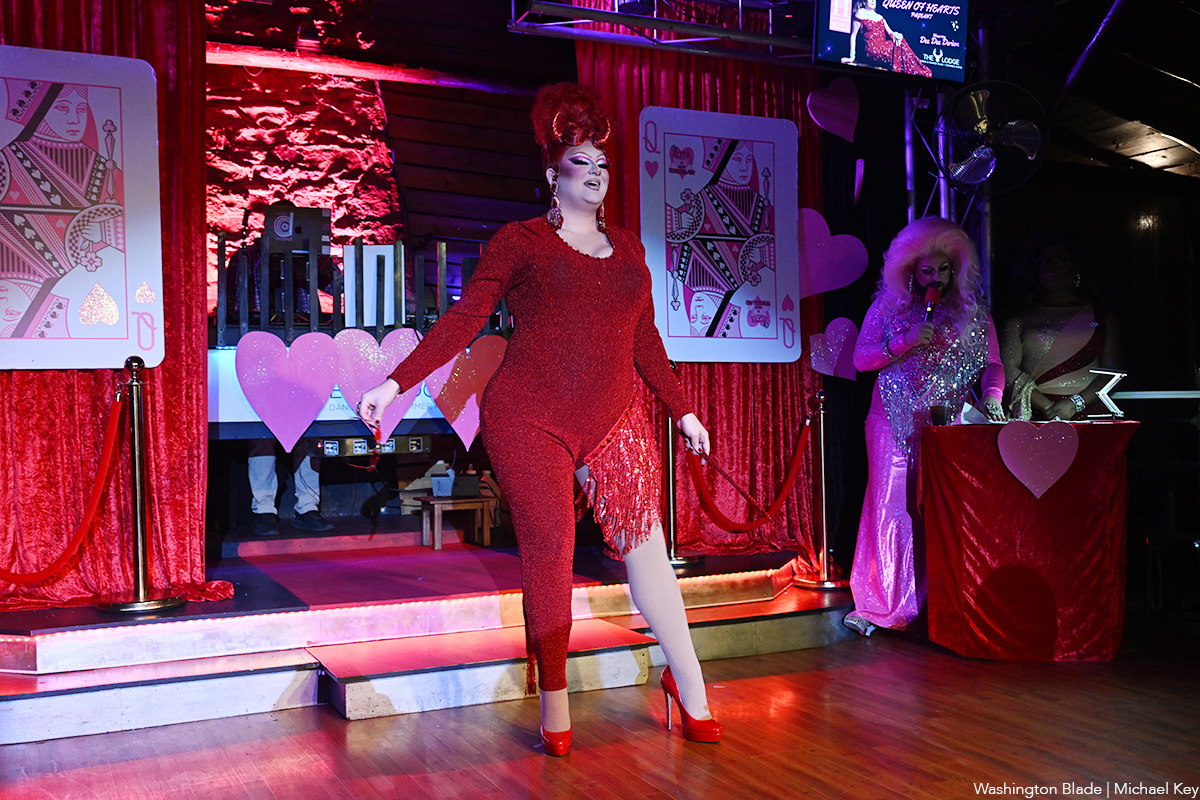
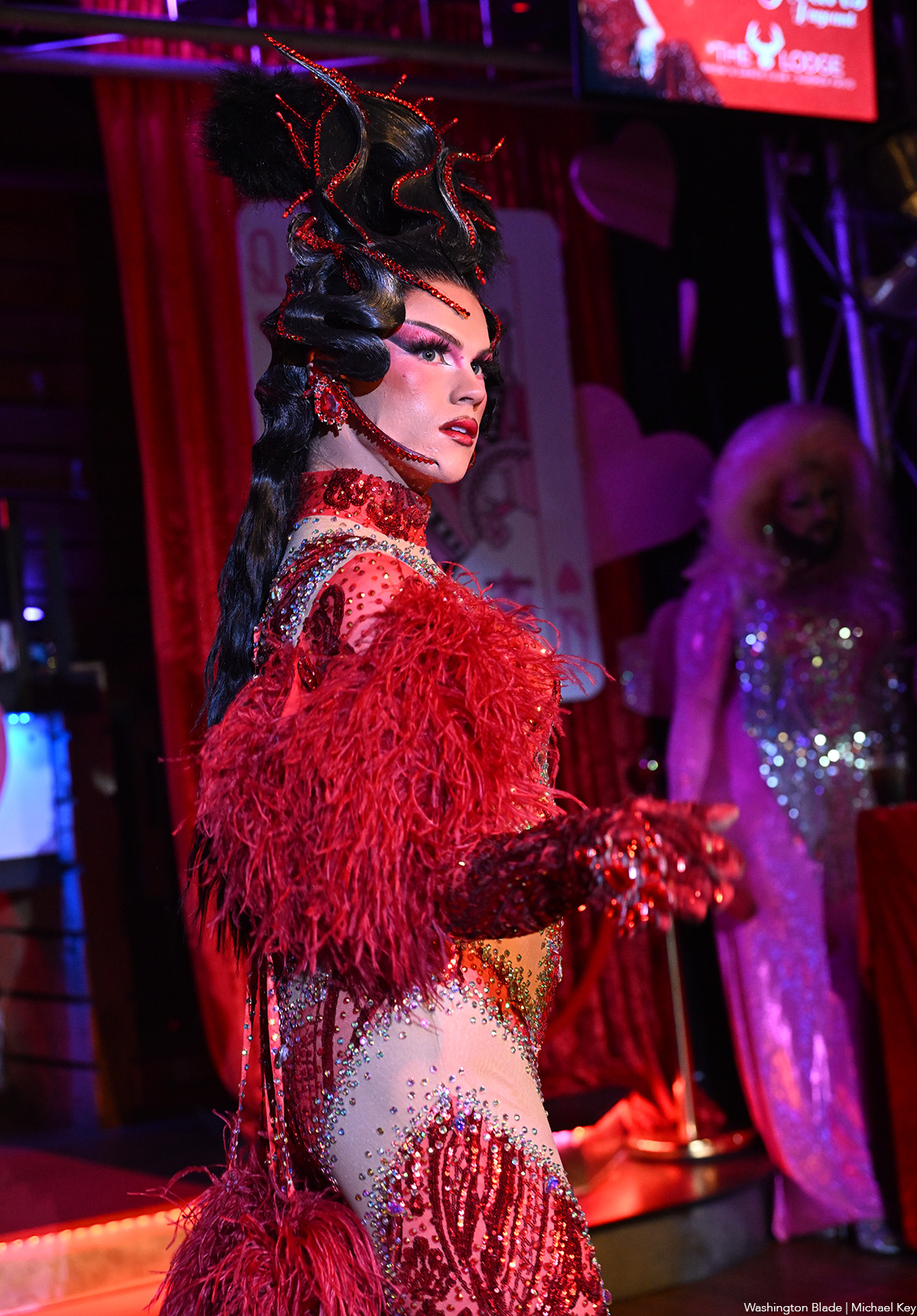
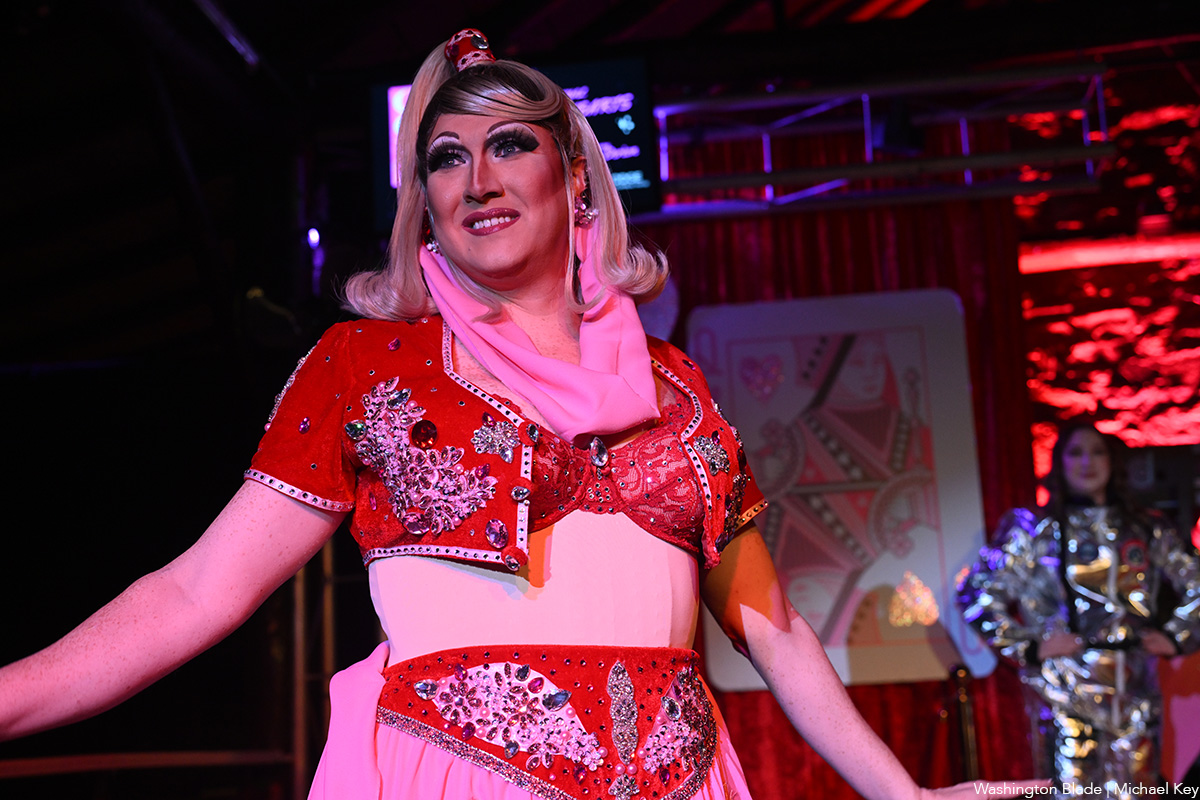
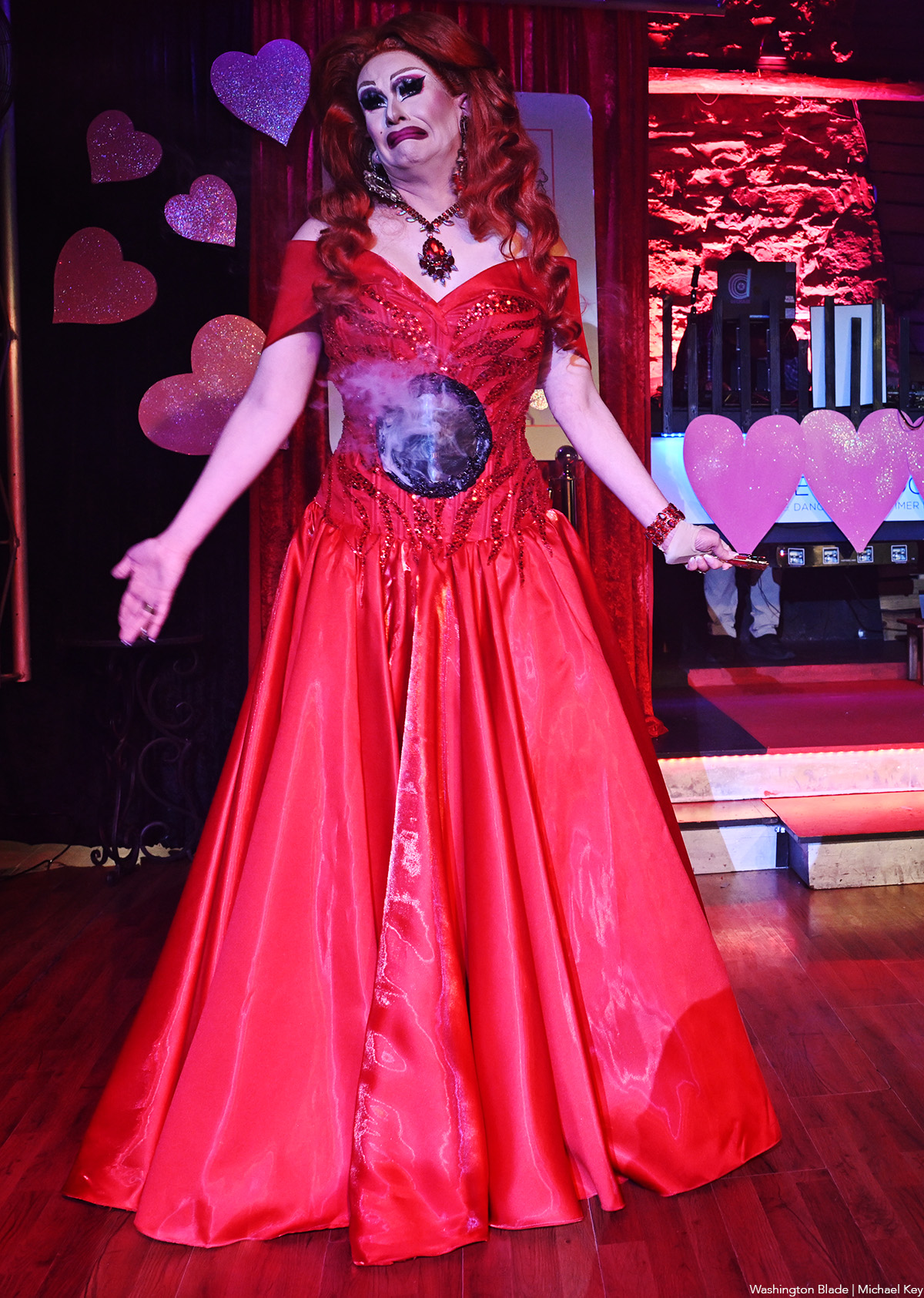
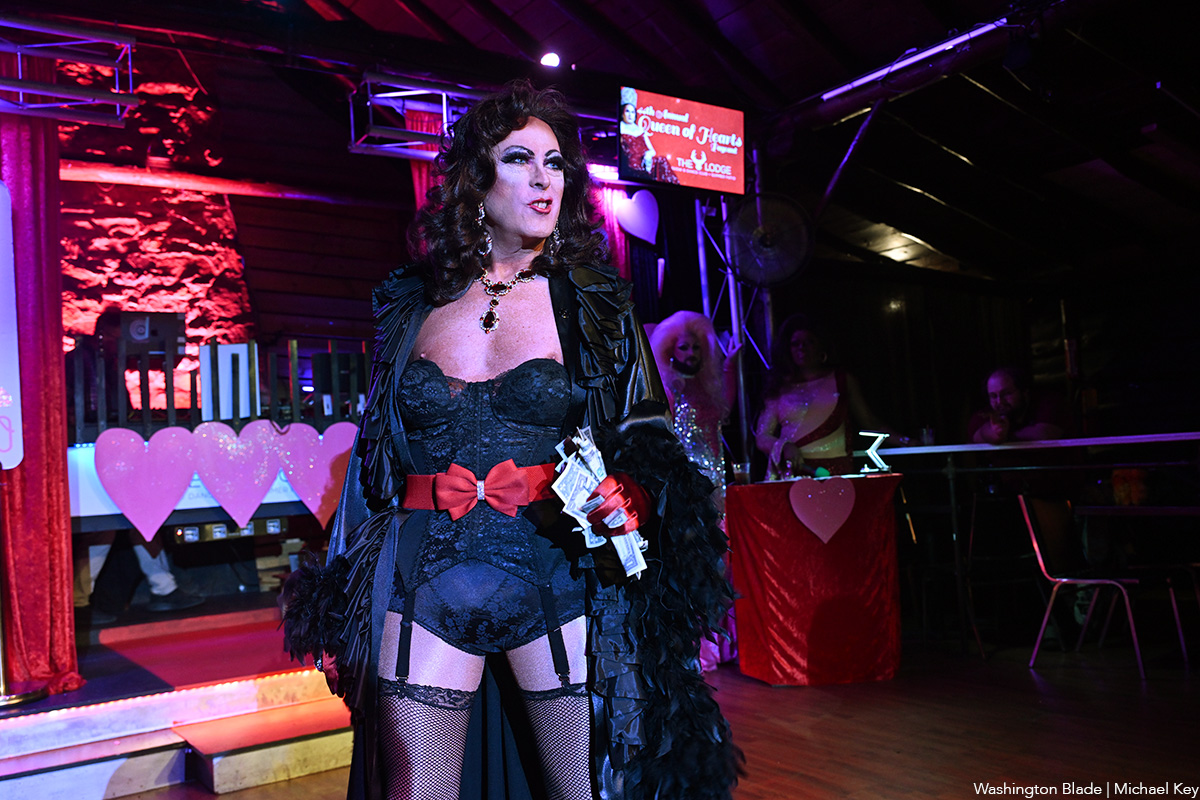
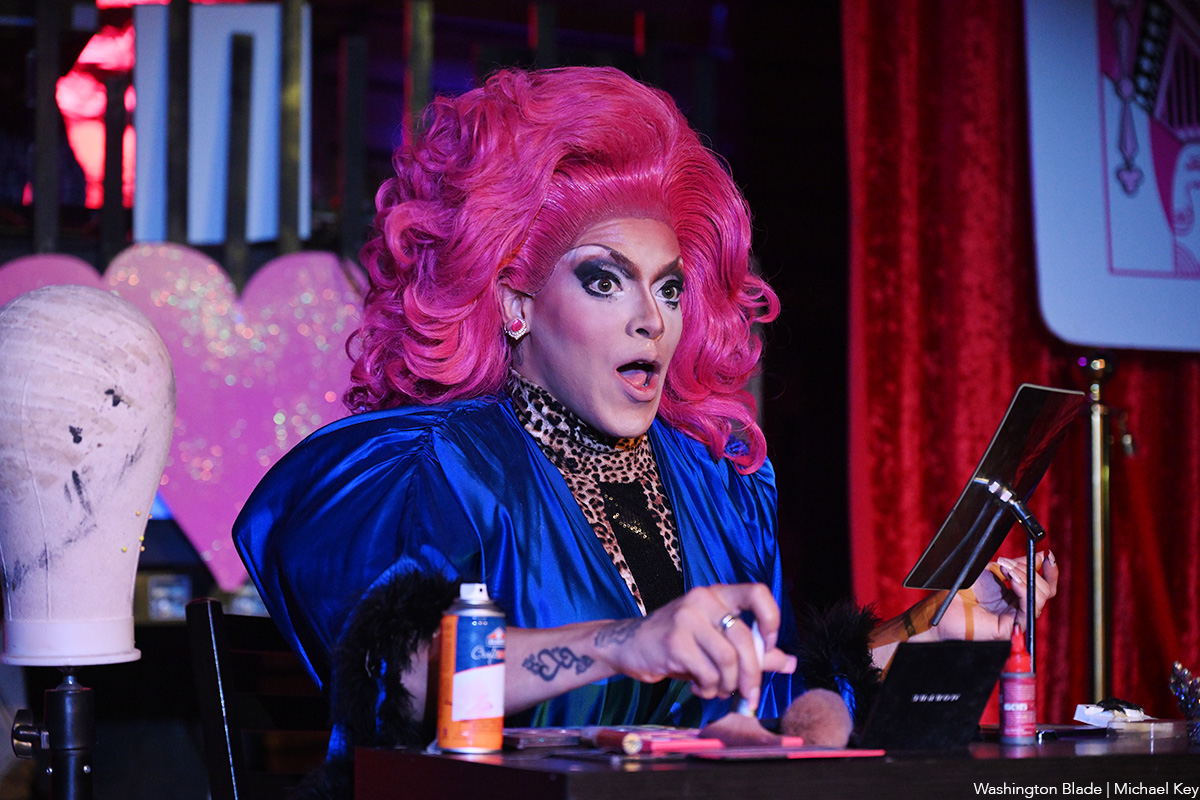
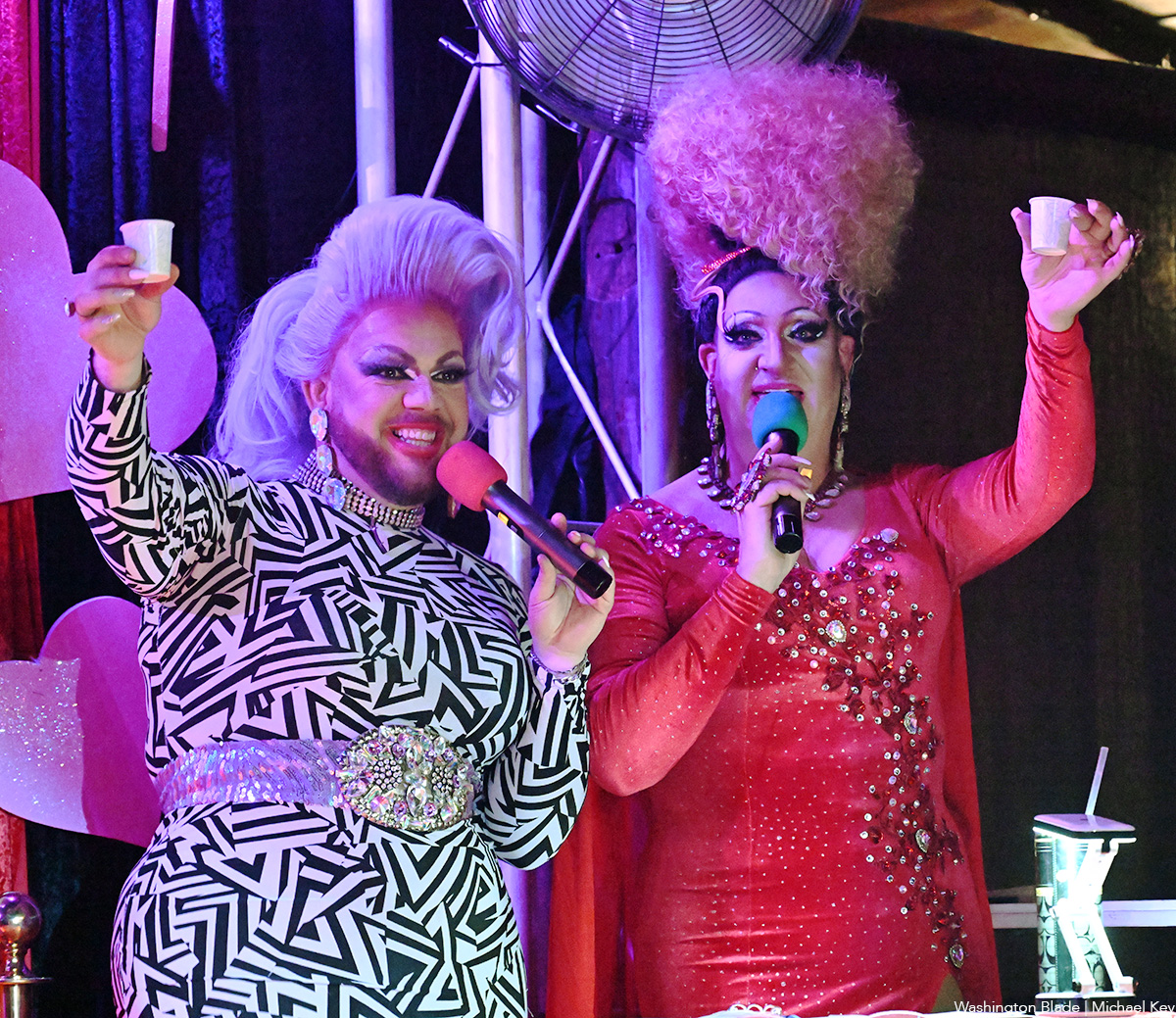
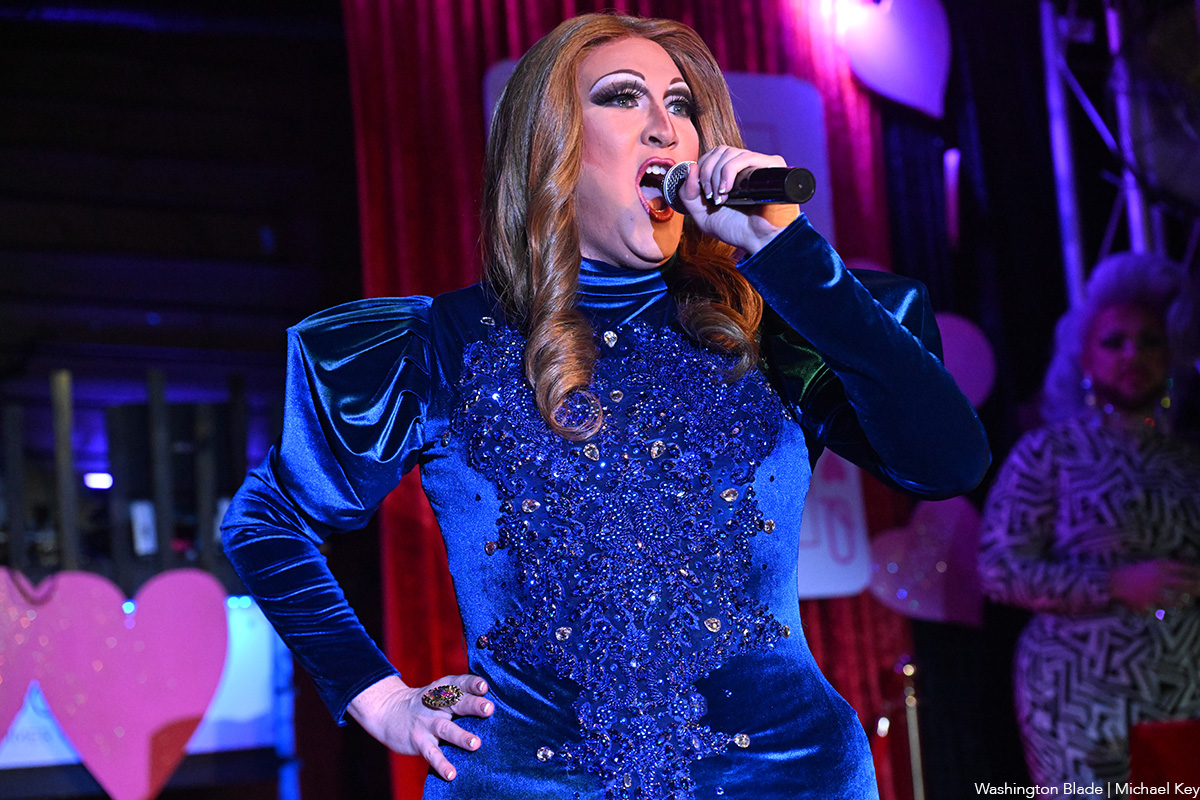
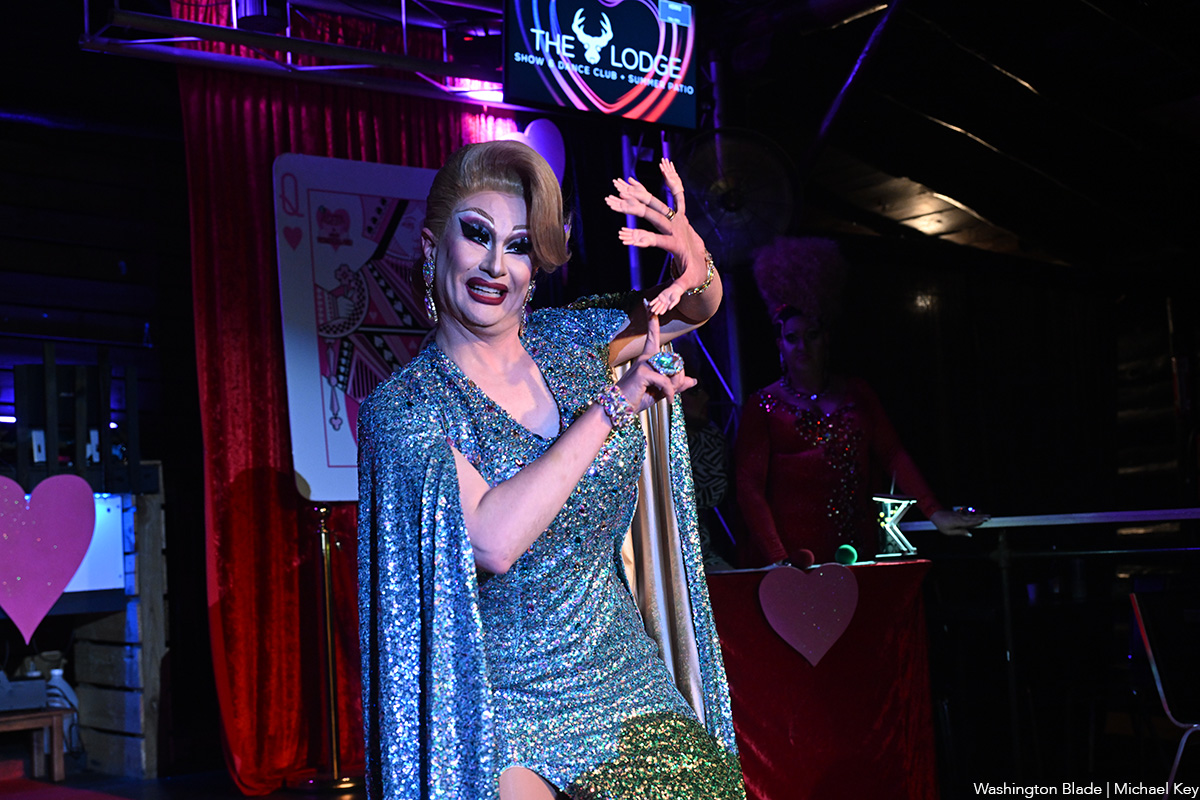
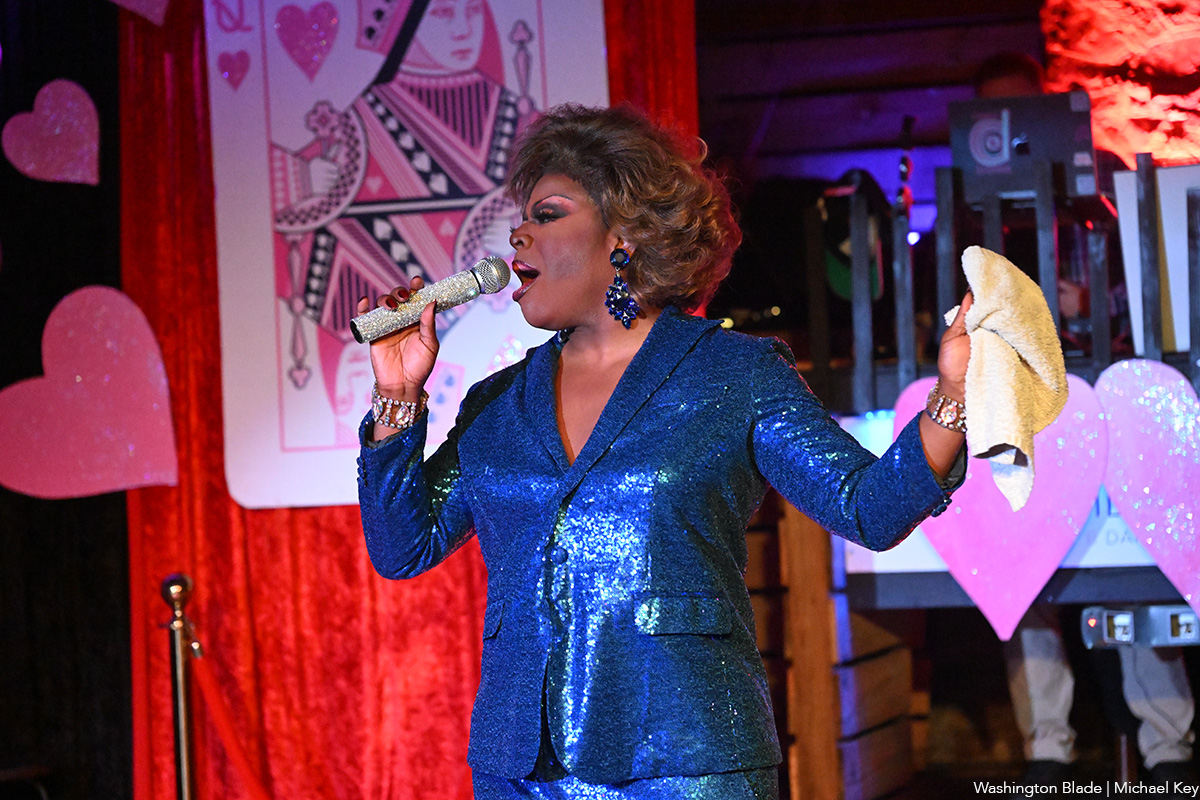
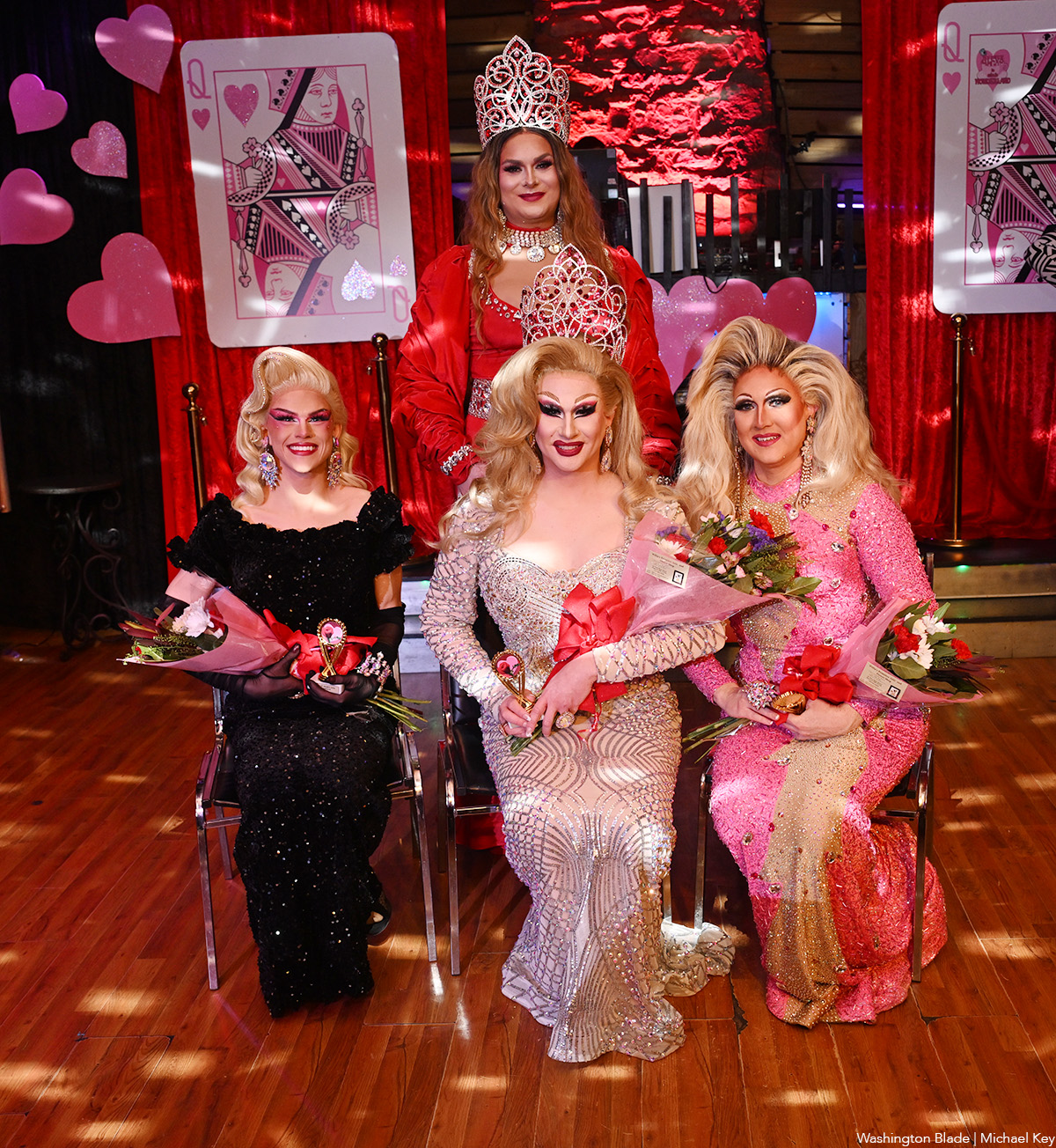
View on Threads
Books
New book profiles LGBTQ Ukrainians, documents war experiences
Tuesday marks four years since Russia attacked Ukraine

Journalist J. Lester Feder’s new book profiles LGBTQ Ukrainians and their experiences during Russia’s war against their country.
Feder for “The Queer Face of War: Portraits and Stories from Ukraine” interviewed and photographed LGBTQ Ukrainians in Kyiv, the country’s capital, and in other cities. They include Olena Hloba, the co-founder of Tergo, a support group for parents and friends of LGBTQ Ukrainians, who fled her home in the Kyiv suburb of Bucha shortly after Russia launched its war on Feb. 24, 2022.
Russian soldiers killed civilians as they withdrew from Bucha. Videos and photographs that emerged from the Kyiv suburb showed dead bodies with their hands tied behind their back and other signs of torture.

Olena Shevchenko, chair of Insight, a Ukrainian LGBTQ rights group, wrote the book’s forward.

The book also profiles Viktor Pylypenko, a gay man who the Ukrainian military assigned to the 72nd Mechanized Black Cossack Brigade after the war began. Feder writes Pylypenko’s unit “was deployed to some of the fiercest and most important battles of the war.”
“The brigade was pivotal to beating Russian forces back from Kyiv in their initial attempt to take the capital, helping them liberate territory near Kharkiv and defending the front lines in Donbas,” wrote Feder.
Pylypenko spent two years fighting “on Ukraine’s most dangerous battlefields, serving primarily as a medic.”
“At times he felt he was living in a horror movie, watching tank shells tear his fellow soldiers apart before his eyes,” wrote Feder. “He held many men as they took their final breaths. Of the roughly one hundred who entered the unit with him, only six remained when he was discharged in 2024. He didn’t leave by choice: he went home to take care of his father, who had suffered a stroke.”
Feder notes one of Pylypenko’s former commanders attacked him online when he came out. Pylypenko said another commander defended him.
Feder also profiled Diana and Oleksii Polukhin, two residents of Kherson, a port city in southern Ukraine that is near the mouth of the Dnieper River.
Ukrainian forces regained control of Kherson in November 2022, nine months after Russia occupied it.
Diana, a cigarette vender, and Polukhin told Feder that Russian forces demanded they disclose the names of other LGBTQ Ukrainians in Kherson. Russian forces also tortured Diana and Polukhin while in their custody.
Polukhim is the first LGBTQ victim of Russian persecution to report their case to Ukrainian prosecutors.

Feder, who is of Ukrainian descent, first visited Ukraine in 2013 when he wrote for BuzzFeed.
He was Outright International’s Senior Fellow for Emergency Research from 2021-2023. Feder last traveled to Ukraine in December 2024.
Feder spoke about his book at Politics and Prose at the Wharf in Southwest D.C. on Feb. 6. The Washington Blade spoke with Feder on Feb. 20.
Feder told the Blade he began to work on the book when he was at Outright International and working with humanitarian groups on how to better serve LGBTQ Ukrainians. Feder said military service requirements, a lack of access to hormone therapy and documents that accurately reflect a person’s gender identity and LGBTQ-friendly shelters are among the myriad challenges that LGBTQ Ukrainians have faced since the war began.
“All of these were components of a queer experience of war that was not well documented, and we had never seen in one place, especially with photos,” he told the Blade. “I felt really called to do that, not only because of what was happening in Ukraine, but also as a way to bring to the surface issues that we’d had seen in Iraq and Syria and Afghanistan.”

Feder also spoke with the Blade about the war’s geopolitical implications.
Russian President Vladimir Putin in 2013 signed a law that bans the “promotion of homosexuality” to minors.
The 2014 Winter Olympics took place in Sochi, a Russian resort city on the Black Sea. Russia annexed Crimea from Ukraine a few weeks after the games ended.
Russia’s anti-LGBTQ crackdown has continued over the last decade.
The Russian Supreme Court in 2023 ruled the “international LGBT movement” is an extremist organization and banned it. The Russian Justice Ministry last month designated ILGA World, a global LGBTQ and intersex rights group, as an “undesirable” organization.
Ukraine, meanwhile, has sought to align itself with Europe.
Ukrainian President Volodymyr Zelenskyy after a 2021 meeting with then-President Joe Biden at the White House said his country would continue to fight discrimination based on sexual orientation and gender identity. (Zelenskyy’s relationship with the U.S. has grown more tense since the Trump-Vance administration took office.) Zelenskyy in 2022 publicly backed civil partnerships for same-sex couples.
Then-Ukrainian Ambassador to the U.S. Oksana Markarova in 2023 applauded Kyiv Pride and other LGBTQ and intersex rights groups in her country when she spoke at a photo exhibit at Ukraine House in D.C. that highlighted LGBTQ and intersex soldiers. Then-Kyiv Pride Executive Director Lenny Emson, who Feder profiles in his book, was among those who attended the event.
“Thank you for everything you do in Kyiv, and thank you for everything that you do in order to fight the discrimination that still is somewhere in Ukraine,” said Markarova. “Not everything is perfect yet, but you know, I think we are moving in the right direction. And we together will not only fight the external enemy, but also will see equality.”
Feder in response to the Blade’s question about why he decided to write his book said he “didn’t feel” the “significance of Russia’s war against Ukraine” for LGBTQ people around the world “was fully understood.”
“This was an opportunity to tell that big story,” he said.
“The crackdown on LGBT rights inside Russia was essentially a laboratory for a strategy of attacking democratic values by attacking queer rights and it was one as Ukraine was getting closet to Europe back in 2013, 2014,” he added. “It was a strategy they were using as part of their foreign policy, and it was one they were using not only in Ukraine over the past decade, but around the world.”
Feder said Republicans are using “that same strategy to attack queer people, to attack democracy itself.”
“I felt like it was important that Americans understand that history,” he said.

More than a dozen LGBTQ athletes won medals at the Milan Cortina Winter Olympics that ended on Sunday.
Cayla Barnes, Hilary Knight, and Alex Carpenter are LGBTQ members of the U.S. women’s hockey team that won a gold medal after they defeated Canada in overtime. Knight the day before the Feb. 19 match proposed to her girlfriend, Brittany Bowe, an Olympic speed skater.
French ice dancer Guillaume Cizeron, who is gay, and his partner Laurence Fournier Beaudry won gold. American alpine skier Breezy Johnson, who is bisexual, won gold in the women’s downhill. Amber Glenn, who identifies as bisexual and pansexual, was part of the American figure skating team that won gold in the team event.
Swiss freestyle skier Mathilde Gremaud, who is in a relationship with Vali Höll, an Austrian mountain biker, won gold in women’s freeski slopestyle.
Bruce Mouat, who is the captain of the British curling team that won a silver medal, is gay. Six members of the Canadian women’s hockey team — Emily Clark, Erin Ambrose, Emerance Maschmeyer, Brianne Jenner, Laura Stacey, and Marie-Philip Poulin — that won silver are LGBTQ.
Swedish freestyle skier Sandra Naeslund, who is a lesbian, won a bronze medal in ski cross.
Belgian speed skater Tineke den Dulk, who is bisexual, was part of her country’s mixed 2000-meter relay that won bronze. Canadian ice dancer Paul Poirier, who is gay, and his partner, Piper Gilles, won bronze.
Laura Zimmermann, who is queer, is a member of the Swiss women’s hockey team that won bronze when they defeated Sweden.
Outsports.com notes all of the LGBTQ Olympians who competed at the games and who medaled.
-

 District of Columbia4 days ago
District of Columbia4 days agoJudge rescinds order against activist in Capital Pride lawsuit
-

 District of Columbia4 days ago
District of Columbia4 days agoTrans activists arrested outside HHS headquarters in D.C.
-

 Opinions4 days ago
Opinions4 days agoHow do we honor Renee Good, Alex Pretti?
-

 Sports5 days ago
Sports5 days agoUS wins Olympic gold medal in women’s hockey

